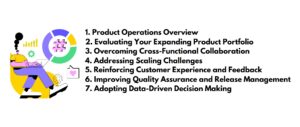Embarking on product development and management challenges? Explore the transformative realm of product operations, a pivotal function that holds the key to streamlining processes and driving optimal outcomes.
In this blog, we unravel the significance of product operations and its potential to reshape your product management approach. So let’s dive in and understand-
How do you know if you need Product Operations?
We’ll explore the key indicators that suggest the need for this strategic function and shed light on the benefits it can bring to your organization.

1. The Role of Product Operations
Product operations, also known as ProdOps, serves as a vital link between product management, engineering, and other cross-functional teams. It focuses on optimizing processes, enhancing communication, and ensuring efficient execution of product strategies.
By establishing clear workflows, streamlining operations, and fostering effective collaboration, product operations empowers companies to deliver high-quality products and drive sustainable growth.
2. Assessing Your Growing Product Portfolio
As your company’s product portfolio expands rapidly, managing and coordinating the diverse range of products becomes increasingly complex.
This begs the question:
Do you find it challenging to align priorities, allocate resources effectively, and ensure seamless coordination across your products?
If so, it may be an indicator that your organization could benefit from implementing product operations. ProdOps provides the necessary framework to navigate the complexities of a growing product ecosystem.
3. Overcoming Cross-Functional Collaboration Hurdles
Effective collaboration across teams is essential for successful product development. However, if your organization struggles with silos, communication gaps, and a lack of streamlined cross-functional collaboration, it may be time to consider product operations.
ProdOps acts as a catalyst, bringing together stakeholders from different departments, fostering communication, aligning objectives, and facilitating a cohesive product development process.
4. Tackling Scaling Challenges and Inefficiencies
Scaling your product operations can pose significant challenges, particularly if your processes are inefficient or lack standardization.
Are you experiencing bottlenecks, delays, or inconsistencies in your product development lifecycle? If so, product operations can help address these issues.
By optimizing processes, implementing tools and frameworks, and establishing scalable systems, ProdOps enables your organization to navigate the scaling phase smoothly.
5. Strengthening Customer Experience and Feedback Management
Capturing and leveraging customer feedback is crucial for building products that meet user needs and drive customer satisfaction. If your organization struggles to effectively manage customer feedback or lacks a structured approach to incorporate it into your product development process, product operations can play a vital role.
ProdOps establishes robust feedback management processes, ensuring that customer insights are collected, analyzed, and integrated into decision-making, fostering a customer-centric approach.
6. Enhancing Quality Assurance and Release Management
Do you frequently encounter challenges related to quality assurance and release management?
Inconsistent product releases, delays, or recurring issues can impact customer satisfaction and erode trust. Product operations focuses on establishing efficient quality assurance processes, implementing release management frameworks, and ensuring smooth product deployments.
This meticulous approach ensures that your products undergo thorough testing, are stable, and are delivered to the market in a timely manner.
7. Embracing Data-Driven Decision Making
In today’s data-rich environment, organizations that embrace data-driven decision making gain a competitive edge. If your company struggles to gather and analyze product data effectively, it may be an indication that product operations is needed.
ProdOps leverages analytics tools, establishes data collection processes, and promotes a culture of data-driven practices. By doing so, it enables product managers to make informed decisions based on quantifiable insights, market trends, and user behavior.
Determining the need for product operations requires a comprehensive assessment of your organization’s growth trajectory, cross-functional collaboration, scaling challenges, customer feedback management, release processes, and data-driven decision-making practices.
If you find yourself facing challenges in these areas, product operations can serve as a strategic function to optimize processes, drive efficiency, and ensure the successful development and management of your products.
By embracing product operations, you can streamline operations, foster collaboration, and position your organization for sustainable growth in a competitive market.
Discover new heights in your product management skills with Accredian’s Product Management program! Our comprehensive course is tailor-made to ignite your journey in product management with industry expertise and practical knowledge.
Start your journey today by exploring our insightful blog page and unleash your potential in this dynamic field. Don’t miss this chance to excel in product management with Accredian!






